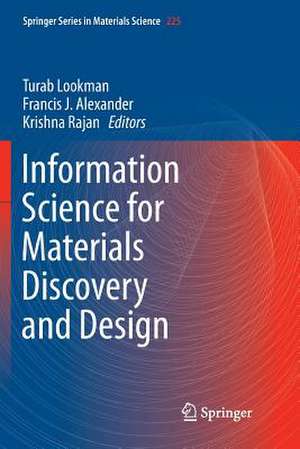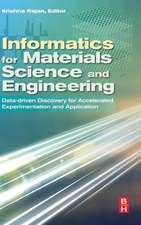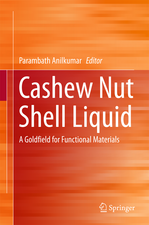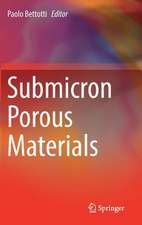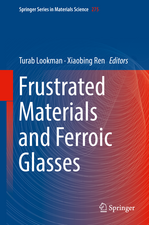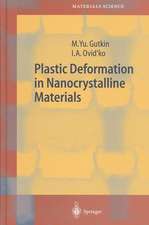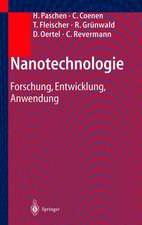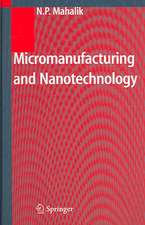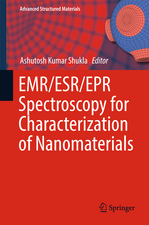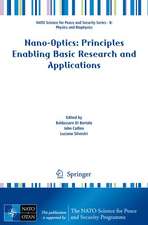Information Science for Materials Discovery and Design: Springer Series in Materials Science, cartea 225
Editat de Turab Lookman, Francis J. Alexander, Krishna Rajanen Limba Engleză Paperback – 27 mar 2019
| Toate formatele și edițiile | Preț | Express |
|---|---|---|
| Paperback (1) | 1383.18 lei 6-8 săpt. | |
| Springer International Publishing – 27 mar 2019 | 1383.18 lei 6-8 săpt. | |
| Hardback (1) | 1579.63 lei 6-8 săpt. | |
| Springer International Publishing – 28 dec 2015 | 1579.63 lei 6-8 săpt. |
Din seria Springer Series in Materials Science
- 18%
 Preț: 1820.22 lei
Preț: 1820.22 lei - 18%
 Preț: 776.09 lei
Preț: 776.09 lei - 24%
 Preț: 689.68 lei
Preț: 689.68 lei - 18%
 Preț: 968.96 lei
Preț: 968.96 lei - 20%
 Preț: 568.94 lei
Preț: 568.94 lei - 18%
 Preț: 953.65 lei
Preț: 953.65 lei - 18%
 Preț: 902.36 lei
Preț: 902.36 lei - 18%
 Preț: 953.65 lei
Preț: 953.65 lei - 20%
 Preț: 948.41 lei
Preț: 948.41 lei - 18%
 Preț: 1143.07 lei
Preț: 1143.07 lei - 18%
 Preț: 1111.53 lei
Preț: 1111.53 lei - 18%
 Preț: 1103.62 lei
Preț: 1103.62 lei - 18%
 Preț: 1225.94 lei
Preț: 1225.94 lei -
 Preț: 473.91 lei
Preț: 473.91 lei - 18%
 Preț: 782.42 lei
Preț: 782.42 lei -
 Preț: 433.47 lei
Preț: 433.47 lei - 18%
 Preț: 1116.40 lei
Preț: 1116.40 lei - 18%
 Preț: 946.24 lei
Preț: 946.24 lei - 18%
 Preț: 945.20 lei
Preț: 945.20 lei - 15%
 Preț: 641.20 lei
Preț: 641.20 lei - 18%
 Preț: 958.56 lei
Preț: 958.56 lei - 18%
 Preț: 1224.36 lei
Preț: 1224.36 lei - 15%
 Preț: 644.82 lei
Preț: 644.82 lei - 24%
 Preț: 833.43 lei
Preț: 833.43 lei - 24%
 Preț: 1060.33 lei
Preț: 1060.33 lei - 18%
 Preț: 964.10 lei
Preț: 964.10 lei - 18%
 Preț: 1224.36 lei
Preț: 1224.36 lei - 18%
 Preț: 1221.20 lei
Preț: 1221.20 lei - 18%
 Preț: 946.87 lei
Preț: 946.87 lei - 18%
 Preț: 1836.92 lei
Preț: 1836.92 lei - 15%
 Preț: 643.34 lei
Preț: 643.34 lei - 18%
 Preț: 1246.32 lei
Preț: 1246.32 lei - 18%
 Preț: 956.81 lei
Preț: 956.81 lei - 18%
 Preț: 953.52 lei
Preț: 953.52 lei - 15%
 Preț: 637.59 lei
Preț: 637.59 lei - 24%
 Preț: 1060.87 lei
Preț: 1060.87 lei
Preț: 1383.18 lei
Preț vechi: 1686.80 lei
-18% Nou
Puncte Express: 2075
Preț estimativ în valută:
264.66€ • 277.08$ • 218.100£
264.66€ • 277.08$ • 218.100£
Carte tipărită la comandă
Livrare economică 05-19 aprilie
Preluare comenzi: 021 569.72.76
Specificații
ISBN-13: 9783319795416
ISBN-10: 3319795414
Pagini: 307
Ilustrații: XVII, 307 p. 134 illus., 88 illus. in color.
Dimensiuni: 155 x 235 mm
Greutate: 0.5 kg
Ediția:Softcover reprint of the original 1st ed. 2016
Editura: Springer International Publishing
Colecția Springer
Seria Springer Series in Materials Science
Locul publicării:Cham, Switzerland
ISBN-10: 3319795414
Pagini: 307
Ilustrații: XVII, 307 p. 134 illus., 88 illus. in color.
Dimensiuni: 155 x 235 mm
Greutate: 0.5 kg
Ediția:Softcover reprint of the original 1st ed. 2016
Editura: Springer International Publishing
Colecția Springer
Seria Springer Series in Materials Science
Locul publicării:Cham, Switzerland
Cuprins
From the Contents: Introduction.- Data-Driven Discovery of Physical, Chemical, and Pharmaceutical Materials.- Cross-Validation and Inference in Bioinformatics/Cancer Genomics.- Applying MQSPRs - New Challenges and Opportunities.
Textul de pe ultima copertă
This book deals with an information-driven approach to plan materials discovery and design, iterative learning. The authors present contrasting but complementary approaches, such as those based on high throughput calculations, combinatorial experiments or data driven discovery, together with machine-learning methods. Similarly, statistical methods successfully applied in other fields, such as biosciences, are presented. The content spans from materials science to information science to reflect the cross-disciplinary nature of the field. A perspective is presented that offers a paradigm (codesign loop for materials design) to involve iteratively learning from experiments and calculations to develop materials with optimum properties. Such a loop requires the elements of incorporating domain materials knowledge, a database of descriptors (the genes), a surrogate or statistical model developed to predict a given property with uncertainties, performing adaptive experimental design to guide the next experiment or calculation and aspects of high throughput calculations as well as experiments. The book is about manufacturing with the aim to halving the time to discover and design new materials. Accelerating discovery relies on using large databases, computation, and mathematics in the material sciences in a manner similar to the way used to in the Human Genome Initiative. Novel approaches are therefore called to explore the enormous phase space presented by complex materials and processes. To achieve the desired performance gains, a predictive capability is needed to guide experiments and computations in the most fruitful directions by reducing not successful trials. Despite advances in computation and experimental techniques, generating vast arrays of data; without a clear way of linkage to models, the full value of data driven discovery cannot be realized. Hence, along with experimental, theoretical and computational materials science, we need to add a “fourth leg’’ toour toolkit to make the “Materials Genome'' a reality, the science of Materials Informatics.
Caracteristici
One of the first books on materials discovery strategy Emphasizes the paradigm of codesign Brings together diverse expertise to improve the model for materials discovery Includes supplementary material: sn.pub/extras
